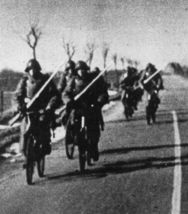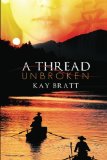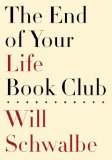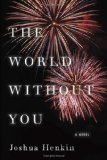Nov 29, 2012
Hello
Here's the latest issue of our free twice-monthly newsletter to keep you up to date with some of the new books and authors featured at BookBrowse.
Also - have you read Will Schwalbe's wonderful The End of Your Life Book Club? If so, please do join us to discuss the book and, this week only, you can ask questions directly of the author. Actually, even if you have not yet read this book - this is a discussion you can safely join without the risk of plot spoilers - so please do join us!
Davina,
BookBrowse Founder & Editor
|
|
BookBrowse Membership
The content in these newsletters is a tiny fraction of the reviews, back-stories, news, previews, free books and more that are available to our members - for the discounted rate of just $29.95 for a year.
Talking of free books - next week we'll be opening up our monthly First Impressions offer with over 300 copies of these five books available to our members (entirely free, including shipping, USA members only). New members who request books are a shoo-in to receive the book of their choice as we prioritize requests based on when a person last received a book, so if you've never received one from us you're top of the pile!  Join BookBrowse |
|
Featured Review
Below is part of BookBrowse's review of Far From the Tree. Read the review in full here  Far From the Tree:
Parents, Children and the Search for Identity
by Andrew Solomon
Hardcover (Nov 2012), 976 pages. Publisher: Scribner ISBN 9780743236713 BookBrowse Rating:  Critics' Consensus:  Review: Review: "There is no such thing as reproduction. When two people decide to have a baby, they engage in an act of production." So begins Andrew Solomon's Far From The Tree, a large (literally, it's 700 pages without the endnotes) and largely captivating book that deals with the flip side of the age-old adage to which its title refers, asking: What if the apple does fall far from the tree? After all, for all the planning and dreaming and designing we do as prospective parents, there's really not a whole lot we can control about the people we give birth to. No amount of speculation or projection prepares us for the undeniable fact that, no matter who we are, "parenthood abruptly catapults us into a permanent relationship with a stranger." So what happens if we don't get the child we expected, or the one we think we deserve? What if we have a different, an "exceptional" child - one who seems to speak another language, or live in a different world, entirely? What if our children are nothing like us? Far From The Tree is about these "exceptional" children, and the families that raise them. Specifically, it is a "study of families who accept their children, and how that relates to those children's self-acceptance - that universal struggle we negotiate partly through the minds of others. In turn, it looks at how the acceptance of the larger society affects both these children and their families." "Through the minds of others" - that's an important factor, because it turns out that when you enter into a conversation about, or with people who are different or exceptional, that conversation is nearly always about identity. Solomon contends that there are two types of identities bestowed on us. Vertical identities are the ones we inherit from our parents - ethnicity, language, religion, nationality. Horizontal identities are traits that don't have such ready transference - sexual preference, disability, psychopathy, genius. Far From The Tree deals with such horizontal identities. Families who are coping with deafness, dwarfism, Down syndrome, autism, schizophrenia, multiple disabilities; families who have transgender children; families whose children are prodigies or who became criminals - each get their own chapter. You may be wondering what these disparate categories could possibly have in common. A fair amount, it turns out. The instances of a horizontal identity such as genius for example, are just as rare and seemingly random as ones for Down Syndrome. The author, who is gay, points out that while each horizontal identity is different from the other, what they together share is the fact that often others perceive them as "undesirable." Solomon says that having a clearly labeled identity allows "parents to stop viewing their different child as ill." Consider, for example, Alcoholics Anonymous. AA was the first group to suggest that a disease could be managed by claiming it as an identity, and that one's very success in dealing with the disease is directly related to the extent to which one can embrace, accept and live within that identity. Embracing who you are, finding a community with whom to identify - all sound great until you consider the politics. In chapter after chapter, case after case (Solomon's research is exhaustive and includes anecdotes from over 250 families), we hear of children and their parents whose lives have been vastly enriched, sometimes even saved, through claiming an identity - deaf culture, dwarfism conferences, autism advocates - but the flip side of the coin is this: If these differences are identities rather than illnesses, why do they need special treatment under the law? "Repairing the body and repairing entrenched social prejudice are objectives that dance a troubling waltz; either fix can have unwelcome consequences. A repaired body may have been achieved through brutal trauma and in response to unfair social pressures; a repaired prejudice can eliminate the rights that its existence had called into being...Disabled people are protected by fragile laws, and if they are judged to have an identity rather than an illness, they may forfeit those safeguards." ....Continued Reviewed by Morgan Macgregor Above is part of BookBrowse's review of Far From the Tree. Read the review and backstory in full here, plus an excerpt
|
|
Beyond The Book

At BookBrowse, we don't just review books, we go 'beyond the book' to explore interesting aspects relating to the story.
Here is a recent "Beyond the Book" feature for Jo Baker's The Undertow. Read the backstory and review in full here A Brief History of Bicycles Through WWII
In The Undertow, the second-generation Billy Hastings makes a name for himself as a racing cyclist in the years between World War I and World War II and goes on to serve in a vital detachment of bicycle soldiers on D-Day in 1944. Bicycle racing had already accumulated a long history by the 1920s and military groups all over the world, such as the British Cyclist Divisions, experimented with bicycle infantry, ambulance transporters, messengers and scouts. (Bicycles were more affordable than horses, and they reduced the need for fuel used by motorized vehicles.) Here are a few significant turning points in the chronology of bicycle history:
1817: Baron Karl von Drais of Germany invents an early bicycle prototype he calls a laufmaschine ("walking machine" - which later becomes known as a "draisine" in honor of the baron). The machine has wheels and handlebars, but no pedals, and is maneuvered by pushing the feet against the ground. 1865: Pedals appear, and the draisine evolves into a velocipede - any human-powered land vehicle with more than one wheel - with a wooden frame and solid tires made of metal or rubber. The ride is jarring, and the machines come to be called "boneshakers." More comfortable riding could be practiced at smooth-floored indoor riding academies, however. 1868: The first recorded bike race takes place in the Parc de Saint-Cloud in Paris. The race was 1.2 kilometers long and was won by Englishman James Moore. 1870s: Advances in technology allow for the first metal-frame bikes, and "high-wheelers" appear. Pedals are attached directly to a large front wheel, which translates into more motion for each revolution of the pedal. As a consequence, people can move at faster speeds. Falls from the high seats, however, are often disastrous. Still, cycling as a hobby and a sport arrives. 1881: Grueling "six-day racing" grows in popularity in England and America, whereby a single rider or a pair of riders circle a track for six days or until a collapse. The sport is outlawed in both countries within a few years because it is so dangerous. 1889: The invention of pneumatic tires - tires made of reinforced rubber and filled with air - changes bike racing forever. Two-wheeled "safety bikes" evolve into lighter bikes with chain and sprocket technology, and the era of high-wheelers comes to an end. 1896: The first bicycle road event in Olympic history takes place. Meanwhile, women are discovering the freewheeling ease of cycling. Susan B. Anthony writes that "the bicycle has done more for the emancipation of women than anything else in the world." 1903: The first Tour de France road race is held as a promotion for a sports newspaper. The prize money totals a whopping 20,000 francs (12,000 for first place, which is approximately six times what a factory worker would have made in a year). A similar race in Italy, the Giro d'Italia, begins a few years later. 
1914: During World War I, armies on both sides continue to make use of bicycles for light infantry and messengers. Bikes have the advantage of being light and fast, and do not require the upkeep of cavalry horses. 1940s: Japan makes extensive use of bicycles during its campaigns in Asia prior to and during World War II. Allied forces begin to use bike troops less and less as mechanized transport becomes a faster, more protective option. by Jennifer G Wilder Above is the backstory to BookBrowse's review of The Undertow. Read in full here, and browse an excerpt |
|
Blog:
How Long Does it Take for a Manuscript to Find a Home?
Sometimes, I think, we are under the magical assumption that a writer has an idea, writes a story, then an editor at a publishing house acquires it, and it is published. Four clean, clear steps in a straight forward-moving line.
Sigh. Maybe I should revise that we to an I.
I am a fiction writer. And my process is - well - kind of different from the one above. I get an idea for a story. But then I write part of it, get stuck, cut half of it, write it again, give it to a critique partner to read, take her extensive notes, cut half of it again, then revise what is left. I repeat this part of the process until the story is done. Then my agent sends it out to an editor. I get a rejection. Then another editor, and I get another rejection. I repeat this until the story is sold, or put in a drawer. And if it is sold, then it has to go through the whole process of getting published...
 The reasons for novels getting rejected are varied, of course. For example,it took B. A. Shapiro eight years to get The Art Forger published. She had already written and sold five novels at that point, but still, she could not find an editor who could and would acquire it. As she says in an interview with Jan Brogan on the blog Jungle Writers Red: "The support of my family and my friends as well as a driving desire to tell stories [kept me going during this dry spell.] It wasn't easy...after five published novels I wrote four more that couldn't find a home. I was thinking about a career change when The Art Forger was acquired by Algonquin Books after many, many rejections by other publishers. I immediately bagged the change idea and started writing a new novel. As far as advice goes, all I can say is that sometimes - not always - but sometimes when you want something badly enough, it can happen. You've just got to get your butt into the chair so that you're there when it strikes." .... The reasons for novels getting rejected are varied, of course. For example,it took B. A. Shapiro eight years to get The Art Forger published. She had already written and sold five novels at that point, but still, she could not find an editor who could and would acquire it. As she says in an interview with Jan Brogan on the blog Jungle Writers Red: "The support of my family and my friends as well as a driving desire to tell stories [kept me going during this dry spell.] It wasn't easy...after five published novels I wrote four more that couldn't find a home. I was thinking about a career change when The Art Forger was acquired by Algonquin Books after many, many rejections by other publishers. I immediately bagged the change idea and started writing a new novel. As far as advice goes, all I can say is that sometimes - not always - but sometimes when you want something badly enough, it can happen. You've just got to get your butt into the chair so that you're there when it strikes." ....
Continued
|
|
Win
 A Thread Unbroken A Thread Unbroken
by Kay Bratt
Publication Date: Nov 2012
Enter the Giveaway
Buy at Amazon
Past Winners
From the Jacket
Chai and Josi share a bond that transcends ordinary friendship. While Chai has always been Josi's protector - ever since they were toddlers, growing up together in a small Chinese village - she finds herself helpless when they are both abducted from their families and sold to faraway strangers. In their new home, with the family of the fisherman who bought them, their old lives are torn away piece by piece. But Chai knows she must stay strong if they're to have any chance of escaping.
That same tenacious hope guides Chai's father, Jun, who fights to find the girls and bring them home, despite seemingly insurmountable odds and a corrupt legal system. The days since the girls were taken soon stretch to weeks and months, but Chai's spirit remains unbroken and Jun's resolve unwavering.
An inspiring story of remarkable courage and indefatigable hope, A Thread Unbroken is about the invisible ties that hold people together, even when everything around them is falling apart.
Reviews
"Kay Bratt, an advocate for children from China, provides a fascinating glimpse of childhood in the world's largest country. The main characters are young girls with a very loving father, dispelling the myth that Chinese do not value daughters. Yet it also shows the shadowy side of the girls' lives when they are abducted to be sold, a practice that lamentably has not been completely suppressed. You will learn about the joys and hardships of growing up female in Asia, with plenty of thrills along the way to keep you reading." - Mingmei Yip, author of Skeleton Women and Song of the Silk Road
5 people will each win a hardcover copy of A Thread Unbroken.
This giveaway is open to residents of the USA only, unless you are a BookBrowse member, in which case you are eligible to win wherever you might live. Enter the giveaway here
|
|
|
Now Discussing
Please join us
to discuss

Will Schwalbe is joining the discussion to answer your questions, so if you have one, please do visit and post! Coming Soon

Discussion opening in early January
|
|
Featured Reading List:
California
|
Author Interviews
Hillary Jordan, author of When She Woke
Paul LaFarge, author of Luminous Airplanes
|
|
|
Survey Winners
Thank you to all who took part in our annual survey, the winners are:
Kayzie W, Lake, MI
Pamela H, Littleton, CO
Eileen G, Bemidji, MN
Laura B, New Caney
Christine G, Madison
Mary T, Westminster
Carol B, Little Compton
Katelyn E, Fergus Falls
Kay H, CincinnatiAll have been contacted & have claimed their prize of the five books of their choice.
|
|
Wordplay
Solve this clue "O M A Well B H
F A S A F A L" and be entered to win the book of your choice from a wide selection Enter NowAll winners are contacted by email. View list |
Answer to the Last Wordplay
It's T E, S! It's the economy, stupid! Background
This catch phrase originated on a sign in the Little Rock headquarters of James Carville, political adviser to Bill Clinton in the 1992 presidential election.
He posted it as a constant reminder that the main focus of the campaign was the economy. The expression was widely used during the campaign and is credited with helping Clinton win election.
|
|
News
Nov 29 2012:
Amazon is to open a European publishing wing, focused on English-language titles for the UK, France, Germany, Italy and Spain. ...(more)
Nov 27 2012:
Bookstores and libraries wishing to be a host location for the 2013 World Book Night USA event (Apr 23) need to apply by December 1. Forms available at...(more)
Nov 27 2012:
The third annual Take Your Child to a Bookstore Day is set for this Saturday, December 1. ...(more)
Nov 26 2012:
Australian author Bryce Courtenay, who wrote about the struggles of life in Australia and South Africa, has died at his home in Canberra, his publisher said on Friday, just two weeks after his latest novel was published and three months after he informed fans that he had stomach...(more)
Nov 21 2012:
Having lost out on their prospective bid to buy Penguin (which is to merge with Random House), News Corp, who already own Harper Collins, appears to have its eyes on Simon & Schuster ...(more)
Read these news stories, and others,
in full.
|
|
|